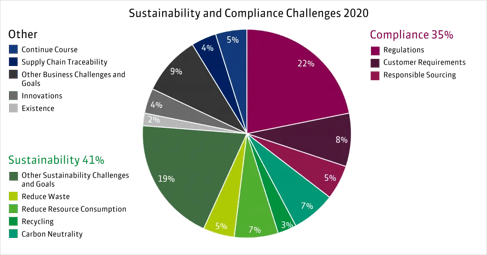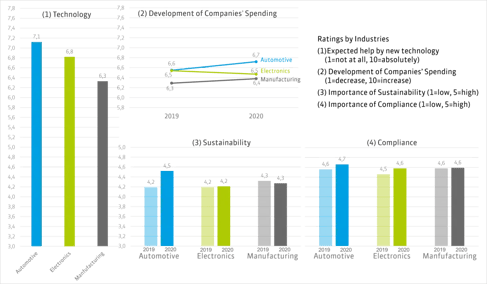The pandemic crisis heavily influenced the year 2020, which likely also impacted iPoint’s Trends Study 2020. However, in addition to the sudden emergence and rising threat of pandemics, the increasing threat of climate change was also very noticeable. Whether new technologies are considered helpful in meeting the challenges of climate change is one of the questions addressed in iPoint’s Sustainability and Compliance Trends Survey 2020.
iPoint’s 3rd Global Trends Study
After two successful conductions of iPoint’s Trends Survey in 2018 and 2019, iPoint continued the research in 2020 to observe and benchmark the sustainability and compliance trends. About 300 experts from companies of various industries around the globe from 37 different countries offered intriguing insights into their compliance and sustainability challenges. The majority comes from North America (46%), Europe (33%) and Asia (12%). 79% of the participants work in the manufacturing, electronics, or automotive industry.
The participants shared their views on the general importance and estimated costs of sustainability and compliance issues for their companies. Additionally, they indicated their expectation on the positive impact of technology on challenges like climate change.
Compliance and Sustainability Grow in Importance
Overall, the survey found that sustainability and compliance are rated very high with a moderate upward trend compared to last year. But compliance was still considered more important than sustainability. The participants face the usual challenges such as compliance with regulations and customer requirements. Nevertheless, this year sustainability goals like carbon neutrality and the reduction of waste and resource consumption became increasingly important. It is evident that sustainability is becoming an ever-greater challenge for companies and is gaining in importance. The PWC study confirms that the threat posed by climate change is being perceived more strongly.

Steady Spending Despite Covid-19
How did the increase in importance of compliance and sustainability affect the trend of companies’ spending? The average rating representing a moderate increase in spending was exactly the same result as in 2019. According to the trend study, especially the automotive industry has reported a significant increase in spending on compliance and sustainability.
With moderate year-on-year increase in spending forecast for 2019 and 2020, compliance and sustainability spending increase, albeit at a low level, but steadily. Even though spending is rising only modestly, the fact that it continues to rise despite the Corona crisis can be interpreted positively. The Covid-19 crisis impacted businesses around the world due to a great uncertainty among individuals and businesses. The economic consequences of the crisis have pervaded companies of various industries and their supply chains by lockdowns and a declining purchasing power.
Also, the automotive industry has been hit hard by the pandemic crisis with lockdowns, temporary shutdowns of plants, travel restrictions and the absence of sales meetings. Nevertheless, especially the automotive industry has reported a significant increase in spending on compliance and sustainability.
Increasing Pressure From Climate Change
In the meantime, the pressure by climate change increases and impacts the global economy. Individuals, businesses and politicians understand the threat of climate change as well as the challenges it poses and are ready to act. For example, the European Green Deal in September 2020 tightens its goal of becoming the first climate-neutral continent in 2050: It is aiming a further reduction in emissions of at least 55% by 2030. Besides, the pandemic crisis has further reinforced the rising trend in consumer demand for sustainability.
New Technologies to Address Climate Change
What can help us to counter the threat of climate change? Are new technologies the solution? The survey reveals that the majority considers new technology as helpful in dealing with challenges such as climate change.
To address climate change and the related demand through new technologies, a separate industry has developed: Green Technology. The Green Technology sector covers everything from electrotechnology to engineering and manufacturing of mechanics, plants and vehicles. Even despite the pandemic economic effects the Green Technology sector continues to grow consistently and resilient. The strongest rise is expected among others for sustainable mobility.
The Automotive Sector Stands Out
These movements in demand and government towards sustainability have put a lot of pressure on the automotive industry already in the past few years, but now all the more pressing. This could explain the strong change of ratings taken place in the automotive sector, especially with regard to sustainability. While the importance of sustainability for the automotive sector in 2019 was just below-average, its rating has increased in 2020. Now it is even relatively far above the average. This is also reflected in a stronger increase in corporate spending on sustainability and compliance. In this context, they also relying to an above-average extent on help from new technologies in coping with challenges such as climate change.

Sustainability and Social Distancing Set the Tone
The Covid-19 pandemic drives a shift of customer demand towards physical distancing, sustainability and digitalization. Customers prefer communicating digitally due to home office policies. Instead of public transportation and car sharing they now prefer private vehicles, and most likely electric vehicles (EV). This could be also caused by changes in emission regulations as well as incentive programs for the purchase of EVs appearing in several countries. The demand for new technologies that address the emerging demand for sustainability and physical distancing are expected to remain as strong or even increase further as purchasing power returns after the crisis. Having a long-term strategy in mind the automotive industry keeps driving new technologies supporting sustainability like autonomous driving, connected cars, electronic vehicles and shared mobility and now even broaden their spectrum to adapt to emerging demands caused by the crisis.
We live in a world of limited resources, but also in a world of unlimited ideas for new products and new technology to meet the world’s requirements.
We at iPoint put our customers’ objectives at the forefront of all our actions and decisions. Our goal is to provide companies with a competitive advantage in today’s complex and dynamic market.
Therefore, we have consolidated our product portfolio into a single suite – the iPoint Suite. The iPoint Suite offers software solutions for the whole product lifecycle and enables companies to holistically integrate compliance and sustainability in their strategy, business and processes.
All results summarized in one paper
Get a summarizing overview of the entire trends study 2020.
Sustainability and Compliance Trends Survey 2021
After the survey was a success for the third time in a row, we are continuing our trend study in 2021. This enables us to identify a trend over time: How is the importance of compliance, the role of sustainability, and corporate spending on these issues evolving over time?
This year, you are the focus
We are interested in what issues are you most concerned with as a compliance and sustainability expert?
Would you be willing to take 2 minutes and share your opinion?






